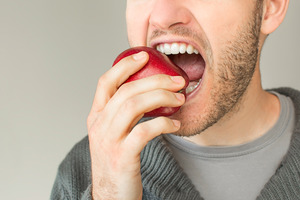
Dentures are one of the most effective methods of replacing a lot of teeth at once. They’re inexpensive, durable, and are meticulously crafted to suit your needs. However, as incredible as modern dentures are, there are some things that it’s worth being aware of before you get them.
For one, full dentures are held in place entirely via suction. While this seal is more secure than you’d think, it can sometimes lead to issues when you eat, ultimately affecting your nutrition. If you’re curious here’s what you should know about how dentures may affect your diet.
How Will Dentures Affect My Nutrition?
While dentures can be incredibly powerful, there are certain limitations to what they can eat. Certain tougher foods, like fibrous vegetables and sinewy meat, can be problematic for dentures to process. Unfortunately, these are also some of the most important foods for nutrition.
The result is that patients with dentures often struggle to eat a well-rounded diet. A recent study published in the Journal of Prosthodontics tracked nutritional benchmarks among patients before and after receiving their dentures. Many of these patients saw a significant decrease in certain key nutrition markers; while they remained at normal levels, experts worry that if there are others factors also impacting the diet of denture users it could lead to serious nutrition problems.
How to Eat a Nutritious Diet with Dentures
In order to get all of the nutrients you need, you’ll need to think a little bit about your diet. Here are some foods that are packed with nutrients that your dentures should be able to handle with ease.
- Oatmeal: Soft and easy to chew, oatmeal is rich in fiber and can be flavored with various toppings like bananas or a drizzle of honey.
- Scrambled Eggs: High in protein and soft in texture, scrambled eggs are gentle on the gums and easy to consume.
- Mashed Potatoes: Nutritious and versatile, mashed potatoes can be enriched with butter, milk, or cream for additional calories and flavor.
- Cottage Cheese: This soft cheese is high in protein and can be easily eaten alone or mixed with soft fruits like peaches or pears.
- Steamed Vegetables: Vegetables like carrots, broccoli, and squash can be steamed until they’re very soft, making them easier to chew and digest.
- Smoothies: A great way to consume fruits and vegetables, smoothies can be made with yogurt or protein powder to boost their nutritional content.
- Soups and Stews: Blended or pureed soups and stews can include a variety of vegetables and meats, providing nutrients in a form that’s easy to manage.
- Soft Fish: Fish like salmon or tilapia are packed with omega-3 fatty acids and are soft enough for easy chewing.
About Our Practice
At Spillman Family Dental of Rockwall, the thing that matters most to us is helping people. No matter what problem you’re facing or the treatments you need, you can count on our integrity and honesty throughout the duration of your treatment. Everyone here is immensely proud of the work that we do, and we take enormous satisfaction from the health of our patients.
If you have any questions about dentures, we can be reached at our website or by phone at (972) 945-0887.
